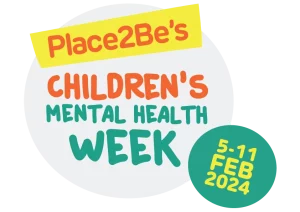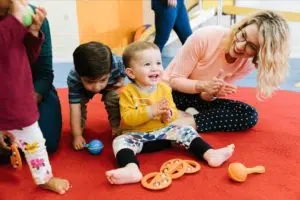Interactive Play for Improving Mental Health of Parents and Children
Guest Blog by PMAC, mental health and wellbeing trainers.
It’s Children’s Mental Health Week so we’ve asked our friends at PMAC about the benefits of play on families’ wellbeing and mental health.

With information overload and societal pressures, it’s no wonder that 49% of British parents feel overwhelmed and anxious. Yet, amidst the stress and worry, a remedy exists within your home’s walls.
It’s in the simple act of play—the laughter, the imagination, the connection—that parents find respite from the storm that comes with anxiety.
How Does Play Improve Parental Wellbeing?
Regular play sessions, whether building Legos, colouring in, or making music, serve as a reliable constant in our busy lives, providing a welcomed break from their unpredictable nature. By distributing a specific time each day for interactive play, we build a comforting routine that anchors our emotions and mitigates any sense of unease.
The value of incorporating routine play into our lives sits in its predictability and ability to transform our mindset. As we engage in these shared play experiences with our children, we naturally adopt a present-focused outlook, shedding the burdens of the past and the uncertainties of the future. Playtime allows us to fully immerse ourselves in the joyous moments of connection, creativity, and discovery.
Scheduled play sessions also play a vital role in fortifying the bond between us and our children. The quality time spent engaging in these shared activities creates a profound sense of belonging and security in children, promoting their emotional wellbeing.
Simultaneously, as we watch our children thrive and flourish in these moments, our stress levels diminish, creating a beautiful relationship that reduces anxiety for us and our little ones.
The Benefits of Attending Baby Class

Baby and toddler classes aren’t just about learning; they’re about creating a bubble where the world’s noise fades into the background, and we can focus entirely on our children. It’s a precious window of ‘protected time,’ offering a break from the hustle and bustle of everyday life. Sensory, music, dance, and creative classes help us slow down, breathe deeply, and engage meaningfully with our little ones.
Classes allow us to become a keen observer of our child’s world. We learn to decipher their cues and understand more about their needs, desires, and discomforts. By getting to know their sounds, movements, expressions, and behaviours, we can strengthen the bond of trust and security between us and our kids.
But it’s not just about observation—it’s about active participation.
Classes are the start of a journey of sensory exploration and cognitive stimulation. As we engage in these activities, we’re not just nurturing our child’s development but weaving threads of connection that bind us together.
How Getting Creative Builds Resilience
The journey of creating and learning side by side isn’t just about crafting projects—it’s an exciting opportunity for parents and children to embody and build resilience together.
Mistakes aren’t seen as failures but as essential stepping stones when getting creative. It’s a lesson in resilience, teaching our children that setbacks are merely detours, not dead ends.
Moreover, these shared experiences become fertile ground for open communication and mutual trust to flourish. Creative sessions give us the perfect opportunity to impart the value of perseverance, showing our children that it’s not about avoiding failure but embracing growth.
Being creative together helps children learn firsthand the art of bouncing back, discovering that resilience isn’t just a trait but a muscle that strengthens with every setback.
But it’s not just children who benefit. As we guide our little ones through the maze of challenges, we are reminded of our resilience. Each hurdle overcome reaffirms our strength and adaptability, bolstering our own mental wellbeing in the process.
Ultimately, the journey of creating and learning together isn’t just about the finished product but the bond forged along the way.
So, seize the opportunity to attend these classes with your little one. Embrace the journey of discovery and connection, basking in the many benefits it brings to your mental wellbeing and the bond you share with your child.”
Children’s Mental Health Week is a mental health awareness week that empowers, equips and gives a voice to all children and young people in the UK. Children’s Mental Health Week was launched in 2015 and each year, hundreds of schools, children, parents and carers take part. Now in its 10th year, the theme is ‘My Voice Matters’.

